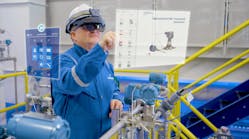Ensuring food safety is more critical than ever today for the industry and supply chain — from trucking to processing and packing to storing food in temperature-controlled environments. Food processors now, more than ever, are looking to restrict physical access to those with appropriate clearance only, and to limit the number of people who can enter a building to protect the safety of food and better prepare for the continued impacts of the COVID-19 pandemic.
In addition, food processors are utilizing video surveillance and access control systems to enhance security and production. Video cameras mounted at key locations in a facility, such as entrances, loading docks and processing areas, can prevent access by unauthorized people. Video can also deter theft. By documenting visitor entry and the shipping or receipt of goods, if any theft or litigation issues arise, the video can be reviewed and used as evidence. In food processing or staging areas, video can even be used to improve production.
“When Illinois mandated (COVID-related) shutdowns in March (2020), we were deemed an essential business. However, at that point we decided to restrict access by installing doorbell cameras at every facility to secure them and ensure that we only have authorized employees entering and exiting,” said Gary Ronning, Vice President of Operations at Frozen Assets Cold Storage (FACS).
Chicago-based FACS operates four cold storage warehouses. The company provides cold storage, freezing, blast freezing, exporting, labeling, cross-docking and transloading services, along with full-service logistics.
According to Ronning, FACS leadership decided to contact a technology integrator that had done previous work on the company’s physical security, surveillanc, and product inventory scanning systems.
“We contacted (a technology convergence provider) and said we wanted doorbell security cameras installed at all our facilities as soon as possible,” said Ronning. “They responded very quickly, completing the installation within a day at two facilities, and a couple of days at another facility.
“With doorbell cameras at all three of our existing facilities, and cameras all over the docks, we are basically on lockdown. We do not allow any visitors, outside vendors or non-employees into our buildings. Truck drivers, for example, now have to check through a specific door or a mailbox to handle any paperwork.”
Traditionally, security cameras and access control systems were installed as independent systems by security integrators. However, by entrusting this task to integrators with an extensive knowledge of the available products and component parts of both network and security systems and how they can be interconnected, there can be tremendous added value at food processing and handling facilities.
“Because the doorbell and dock cameras tie into our existing access control and security system network, our IT manager can remotely monitor what is going on from different viewpoints 24/7 at work or home,” said Ronning.
It is also an advantage to find a technology provider that handles all aspects from installation of hardware to integration with the existing IT network.
“(The technology integrator) is a one-stop shop. They installed the antennas and did all the networking. They worked at all hours including nights and weekends to get the job done, and we have not had any issues with the system,” Ronning said.
According to Ronning, the surveillance cameras on the shipping and receiving docks also help to deter theft and claims. “The cameras on the dock provide video proof of exactly how many pallets we load onto the truck before sealing it,” he said. “So, if a different number of pallets is noted on receipt, we can email the customer the video.”
Assuring food safety and compliance
4Earth Farms, one of the largest vertically integrated conventional, organic and specialty grower-packer-shippers in the U.S., also wanted to restrict entry to only authorized personnel at its 160,000-square-foot packing facility near Los Angeles. The company supplies wholesale, private label and foodservice produce to retail and wholesale customers around the globe.
“Since we handle produce, we fall under the umbrella of food handling so we need to make sure that only those authorized enter the facility, and only employees trained in food safety touch product,” said 4Earth Farms information technology and security system manager Clint Miguel.
The company’s packing facility is a Safe Quality Food (SQF)-certified site. This certification is a rigorous food safety and quality designation recognized by retailers, brand owners and food service providers worldwide.
“The SQF program is very stringent and specifically calls out site security as a good manufacturing practice that needs to be maintained so nobody can come in and tamper with the food supply,” said Miguel.
A few years ago, Miguel was looking to enhance the plant’s physical security. He began a search for companies that provide access control and video surveillance, but wanted consultative expertise, not a vendor that offered a sales-oriented, one-size-fits-all approach. He turned to a technology integrator with experience in the food industry.
“From the outset, (the technology integrator) was collaborative and set up a good strategic plan as to what we needed and how we rolled it out, including configuration, wiring and implementation,” Miguel said.
According to Miguel, the technology consultant was receptive to tailoring the number of entry access points and surveillance cameras to the plant’s specific needs to make it as secure as possible.
After installation, the packing facility now has access controls at all doors and access points, along with physical security cameras for surveillance.
“Now everyone who enters has to check in and get vetted. Once they get vetted, we provide a keycard that gives them access to certain parts of the facility,” said Miguel, who noted that there are different levels of security for certain areas, such as the warehouse and office.
The packing facility’s employees are logged in and out of the warehouse and production area through turnstiles and doors. This is crucial to ensure not only regulatory and inspection compliance, but also that only authorized people wearing PPE are touching and handling food.
This approach also helps provide physical separation between break and work areas. As a result, with the break area outside the turnstiles, there is a clear distinction between work and break time, which tends to increase productivity while reducing payroll expenditures.
At the facility, even truck drivers need an access keycard to enter the building. To get an access card, drivers must leave either state identification or their truck keys. Otherwise, drivers are limited to the loading dock where they can sign off on documentation indicating product receipt or drop-off.
According to Miguel, software integrates entry access control with surveillance cameras at the facility to provide a wide range of useful security and productivity information.
“We use software to view who is entering the building, and there are retrievable reports that can indicate which doors they went through at which times,” said Miguel. “With cameras throughout the facility, we notice any physical bottlenecks of product movement etc., which we can view to make improvements. Our management team is good at noticing such things and works together to ensure that everything runs as smoothly as possible.”
According to Miguel, the access control and surveillance system helped 4Earth Farms’ packing facility achieve its designation as an SQF-certified site. A few years after installation, the system continues to operate reliably.
With the project complete, Miguel noted that coordinating with the single-source provider on installation was vital to avoid disrupting the plant’s continuous operations.
“To wire the facility, you cannot block off a whole aisle just to mount a camera. We had existing infrastructure, so they handled the installation and integration (including camera wiring and mounting) to avoid interfering with our 24-hour production schedule,” said Miguel.
Eric Brackett is President of BTI Communications Group, a technology convergence provider that serves the food, logistics, healthcare and aerospace sectors. The company acts as a single source provider of physical security, access control, network, and complex phone (VoIP) systems, down to installation of wiring and conduit.



